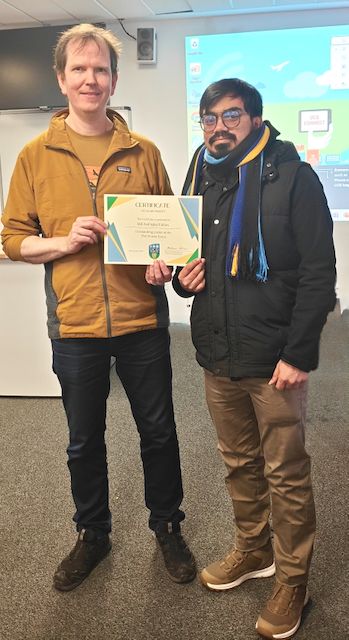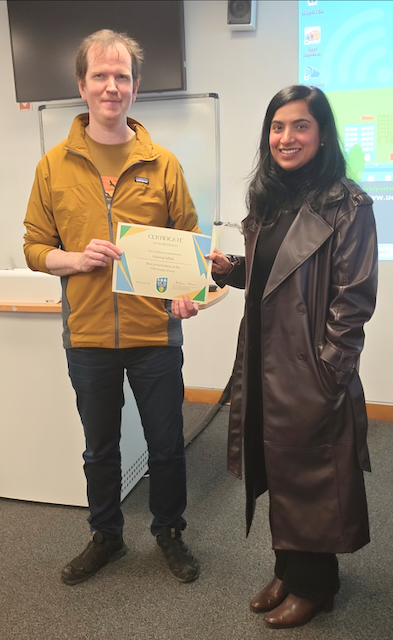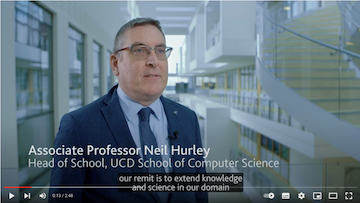News
News
- PhD Poster Event 2026
- Second cohort of students conferred with MSc in Cybersecurity
- SECURENET 2026
- Second BDIC Conference on Computer Science and Electrical/Electronics Engineering
- Funding for Research on Resilient Robotic Teleoperation over Open RAN
- Transforming Survivor Centred GBV Response Using Human Centred AI Agents
- UCD NetsLab Launches CollabXR: A 6G-Enabled Haptic Collaboration Project
- UCD COMPUTER SCIENCE STUDENT WINS HUAWEI TECH ARENA 2025
- UCD School of Computer Science Medal Winners 2024–2025
- AI2PEAT WINS NATIONAL CHALLENGE FUND PRIZE
- UCD NetsLab Wins Best Paper Award at IEEE CNS 2025
- Students achieve outstanding results in Web Intelligence Classification Challenge
- Conferring of degrees June and September 2025
- CS News 2025
- SECURENET 2025
- EoI for Postdoctoral Fellowships 2025
- “Back to the Future” Advanced AI Careers Evening
- SOLARIS Shortlisted for Best Research Project at the 2025 Education Awards
- First global carbon neutral conference in ICT for Sustainability
- ARMOR: Advancing AI-Driven Security for 6G Open RAN Networks
- AI research and education at UCD and career opportunities in Ireland
- Political Bias on X before the 2025 German Federal Election
- A new Book co-authored by UCD CS Assoc. Prof. Madhusanka Liyanage Explores the Foundations and Applications of Mobile Edge Computing
- UCD NetsLab Leads a Global Consortium to Tackle 6G Security Challenges
- First students conferred with MSc in Cybersecurity
- Second Workshop on the Responsible Use of Generative AI in Research
- First BDIC Conference on Computer Science and Electrical/Electronics Engineering
- Paul Gillen - global leader in the fight against cyber crime
- CS students awarded Naughton Foundation Scholarships
- First Workshop on the Responsible Use of Generative AI in Research
- Dr Brett Becker (1976 - 2024)
- UCD Computer Science Researchers Receive ReCLAIM Award for GenAI Project
- MSc Cybersecurity Research Project Presentations 2024
- UCD BSc Computer Science Conferring 2024
- UCD NetsLab Launches ORAN Testbed to Advance Security and Privacy in Beyond 5G and 6G Networks
- UCD CS Netslab researchers in a global collaboration to bolster Zero Touch security and privacy for 6G networks
- UCD STEM Early Career Researchers Symposium
- EoI for Postdoctoral Fellowships 2024
- CS start-up a finalist in VentureLaunch Accelerator Programme
- University College Dublin Joins ROBUST-6G Project
- Cyberwise Cyber Security Shared Learning Day
- 2nd Summit on Security and Privacy in Future Mobile Networks (SECURENET) 2024
- Message from the Head of School
- Ulysses Medal Awarded to Professor Geoffrey Hinton: The Godfather of AI
- UCD CS academics invited to organise prestigious Dagstuhl seminars
- UCD College of Science Women in Science Mentoring Awards
- PhD Poster Event 2024
- “Back to the Future” Software Engineering Evening
- Improving resilience to the threat of coastal flooding
- Alumnus In Conversation - Fergal Reid, VP of AI at Intercom (PhD 2013)
- Computer Science Summer School
- Welcome to CS News 2023
- EoI for Postdoctoral Fellowships
- EU MSCA SE RE-ROUTE Project Kicks Off to Design Futuristic Multi-Modal Transportation Platform
- PhD Poster Event
- UCD wins at AI Ireland AI Awards
- UCDCS Athena SWAN Award
- Jan Łukasiewicz
- International Men’s Day
- 1st Year BSc Halloween Networking Event
- Ada Lovelace Energy Hackathon
- 5G for digital healthcare in COVID-19
- UCD CS Faculty Elected Vice Chair of ACM SIGCSE
- CS Big Data project for strategies to combat childhood obesity recognised for its innovation potential
- Welcome to CS News 2022
- UCD CS to host the 27th ACM Innovation and Technology in Computer Science Education
- UCD Computer Science Success in SFI Frontiers to the Future
- Why study Computer Science at UCD?
- CAMEO project receives funding from the Disruptive Technology Innovation Fund
- Congratulations to the Class of 2021 - MSc Forensic Computing & Cybercrime Investigation
- Computer Science Colleagues’ success in Interdisciplinary Research Scheme
- ML Labs Annual Newsletter
- Seagate CORTX Challenge
- UCD Academic awarded the 2021 Beijing Great Wall Friendship Award
- Recent funding successes and industry collaborations
- EU H2020 SPATIAL project
- recsyslabs - privacy preserving personalisation for publishers
- Congratulations to our recent PhD graduates
- UCD In Conversation: Cybercrime causes, trends, and prevention
- CS researchers partner in three successful Disruptive Technologies Innovation Fund projects
- Welcome to CS News, the new UCD CS magazine
- Congratulations to our recent PhD and research MSc graduates
- New book showcases digital forensic research by UCD law enforcement graduates
- Training the next generation of Computer Scientists
- Industry Partnership Event to showcase new research on using machine learning
- Poems that Solve Puzzles: The History and Science of Algorithms
- A welcome to incoming first year Computer Science students
- Zoom for Thought with Prof. Muthoni Masinde
- iPROCEEDS-2: Starting of the long-distance master programme on forensic computing and cybercrime investigation
- Short Term Contract Positions Opportunities
- Most Influential Paper Award at the 28th International Requirements Engineering Conference
- From the School of Medicine in partnership with the School of Computer Science
- 2nd Workshop on Implementing Machine Ethics on 30th June
- CeADAR receives Enterprise Ireland Funding for a new Supercomputer
- Assistant Professor Brett Becker awarded Research Fellowship
- UCD CS Masters Student wins prestigious Intel Student Scholarship
- Navigating COVID19 data with a little help from a tame data scientist
- PhD Positions
- UCD Computer Science Project Nominated for Two Education Awards
- Vacancies - Lecturer/Assistant Professor in Computer Science (x2)
- Ad Astra Fellows - Applications to Computer Science
- CALL OPEN - PhD Scholarships 2020 in Machine Learning
- Commissioner of An Garda Síochána visits the School of Computer Science for Conferring
- Computing Education Group SIGCSEire to launch in UCD on December 11th
- UCD Computer Science wins over €34m in Research Grants in 2018-19
- UCDCS Best Short Paper award 13th ACM Conference on Recommender Systems (RecSys)
- CS Sparks Programme
- CS Sparks

Image credit Rosemary Deevy
PhD Poster Event 2026
We were delighted with the turn-out for our PhD/MSc by Research Poster event on Friday 30 January 2026. 19 students prepared and displayed posters and a team of judges evaluated the posters. Our PhD poster event is a platform for research students to engage with fellow staff members, seeking valuable comments and advice to enhance the quality of their research work. It also offers a unique opportunity for staff and other participants to gain insights into the ongoing research work within the school.
There were five research themes:
- Bioinformatic, Health Information, HCI - 3 posters
- Data science, ML and AI - 6 posters
- Emerging Topics (Blockchain, Ethics, Quantum Computing, etc) - 1 poster
- Security and Network - 6 posters
- Software Engineering, Distributed Systems, Computing, Information systems - 3 posters
Afterwards, 50 people attended a special lunch where Assistant Professor Andrew Hines, Director of Graduate Research, presented the Outstanding Poster Prize to Md. Asif Iqbal Fahim and to Kanwal Aftab for the best presentation at the event.

Md. Asif Iqbal Fahim receiving his prize from Assistant Professor Andrew Hines. Thesis title - Software Self-Extension with SelfEvolve: an Agentic Architecture for Runtime Code Generation (Supervisor - Assistant Professor Alessio Ferrari)

Kanwal Aftab receiving her prize from Assistant Professor Andrew Hines.
Thesis title - Computer Vision for Indoor Multimedia Geolocation (Supervisor - Associate Professor Mark Scanlon)
Image credits Rosemary Deevy
Full poster list
| Student |
Principal Supervisor |
Research theme |
Poster title |
| Paul Banahan |
Assist. Prof. Aonghus Lawler |
Bioinformatic, Health Information, HCI |
Quantitative and Qualitative Assessment of Generative AI for Cross-Modal CT-to-MRI Translation in Spine Imaging |
| Cristina Perea del Olmo |
Assoc. Prof. David Coyle |
Bioinformatic, Health Information, HCI |
Generative AI in the Online Mental Health Information Ecosystem: Young Adults’ Use and Perceptions |
| Aon Safdar |
Assist. Prof. Mohamed Saadeldin |
Bioinformatic, Health Information, HCI |
CAViT: Channel-Aware Vision Transformer for Dynamic Feature Fusion |
| Fraol Gelana Waldamichael |
Assist. Prof. Helard Becerra |
Data science, ML and AI |
Measuring What Matters: Anatomical Plausibility in Generated Medical Images |
| Xiao Li |
Assoc. Prof. Ruihai Dong |
Data science, ML and AI |
From Rules to Flexibility: A Resource and Method for SEC Item Extraction in Post-2021 10-K Filings |
| Cathal Ó Faoláin |
Assist. Prof. Andrew Hines |
Data science, ML and AI |
Éist: An Ear Inspired Speech Transformer |
| Zhonghe Chen |
Assist. Prof. Deepak Ajwani |
Data science, ML and AI |
Synthesizing Fault Localization Datasets |
| Reyhaneh Kheirbakhsh |
Assist. Prof. Aonghus Lawler |
Data science, ML and AI |
Modality Fusion of MRI and Clinical Data for Glioma Tumor Grading |
| Kanwal Aftab |
Assoc. Prof. Mark Scanlon |
Data science, ML and AI |
Computer Vision for Indoor Multimedia Geolocation |
| Rashmi Ratnayake |
Prof. Liam Murphy |
Emerging Topics (Blockchain, Ethics, Quantum Computing, etc) |
A Trust-By-Design Consensus Mechanism for Blockchains |
| Charuka Moremada |
Assoc. Prof. Madhusanka Liyanage |
Security and Network |
LLM-XAI: LLM Driven Explainable AI for Network Intrusion Detection |
| Vidura Ravihansa |
Assoc. Prof. Madhusanka Liyanage |
Security and Network |
Energy-Aware Security for Federated Learning: A Causal Framework |
| Haula Galadima |
Assist. Prof. Rob Brennan |
Security and Network |
Evaluating Incident Response in CSIRTs using Cube Socio-technical Systems Analysis |
| Hongyi Guo |
Assoc. Prof. Madhusanka Liyanage |
Security and Network |
Adaptive Model Poisoning Attacks in Federated Learning |
| Dinushika Chithrani |
Prof. Liam Murphy |
Security and Network |
Privacy-Preserving LLM Framework for Secure Data Sharing in O-RAN Digital Twins |
| Alkabashi Alnour |
Assist. Prof. Alzubair Hassan |
Security and Network |
Adaptive authorization as a second line of defence to mitigate residual risk |
| Zhenghao Wu |
Assist. Prof. Hadi Tabatabaee Malazi |
Software Engineering, Distributed Systems, Computing, Information systems |
Resilient Services Computing in the Edge-Cloud Continuum |
| Shaoshu Zhu |
Assist. Prof. Hadi Tabatabaee Malazi |
Software Engineering, Distributed Systems, Computing, Information systems |
Critical Evaluation of Energy-Carbon Trade-off in Sustainable Serverless Edge Scheduling |
| Md Asif Iqbal Fahim |
Assist. Prof. Alessio Ferrari |
Software Engineering, Distributed Systems, Computing, Information systems |
Software Self-Extension with SelfEvolve:an Agentic Architecture for Runtime Code Generation |
Many thanks to Rosemary Deevy and Travis Grotewald in the Postgraduate Programme Office and Assist. Prof. Andrew Hines, our Director of Graduate Research, for organising the event and also to all who came and supported the students and especially to the judges.
Graduate Research in UCD School of Computer Science
The School currently has over 100 PhD and MSc Research students, located in one of our research centres such as the (opens in a new window)Insight Centre for Data Analytics or our Centres for Research Training: (opens in a new window)ML-Labs and (opens in a new window)d-real. Many members of faculty are active in supervising PhD students. More info here https://www.ucd.ie/cs/study/researchdegrees/
Why do a PhD?
In 2023 we recorded some of the students talking about their PhD studies. (opens in a new window)Watch it here (2 mins 40 seconds)

See our YouTube channel for (opens in a new window)more videos.
4 February 2026